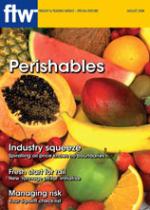INSURE OR perish should be the watchwords
of all traders, who constantly fight their way
through a jungle of risk, according to Malcolm
Hartwell, director in the shipping department of
attorneys, Deneys Reitz.
And one of the ways of sensibly managing
certain of these risks is to shift the transit risks
onto a marine insurer, he added.
Obviously the risks faced by perishable foods
are more extensive than those faced by
general cargo.
“Of particular concern to traders in
perishable products is the risk that the cargo
will be damaged as a result of a variation in
temperature,” said Hartwell. “The carriage of
perishable products is, by definition, a highly
specialised trade and underwriters will not simply
provide cover against all loss or damage caused
by any variation in temperature.”
He pointed out that one of the broadest
exceptions relied on by underwriters to limit
their exposure to risks is that they will not be
liable for loss or damage caused by the inherent
nature of the cargo being carried.
“It is, for example,” Hartwell said, “inherent
in the nature of bananas that if they are not
carried at precisely the right temperature and
with the requisite levels of CO2, they will ripen
prematurely. Underwriters will not cover
that risk.”
Insurers also limit their exposure to certain
of the risks caused by the inherent nature of
perishable foods by only providing for cover
or loss or damage caused by a variation in
temperature in certain circumstances.
“Those limited circumstances,” Hartwell
said, “are: fire or explosions; stranding or
sinking; overturning or derailment; collision or
contact; discharge at a port of distress; and the
breakdown of refrigerating machinery.
“The standard cover
provided only responds
to a claim in the event
that the machinery
breaks down for a
continuous period of not
less than 24-hours – but,
by agreement with insurers,
this period can be reduced.”
According to Hartwell,
the Institute of London
Underwriters (ILU) has
developed the most
common standard
form of cover – and
has also produced
specialist trade clauses
for, amongst other things,
frozen meat and other
frozen products.
“Those clauses come in two
forms,” he said. “The institute’s “frozen
food clauses (A)” to a large degree mirror
the risks covered on general cargo by the ICC
(A) clauses. The other form is to be found in the
“frozen food clauses (C)” which cover specific
risks, but also incorporate the exclusions to be
found in the ICC (C) clauses.”
Many of the disputes under the “frozen food
clauses (A)”, Hartwell added, arise out of an
interpretation as to whether or not the cause of
the loss has been a breakdown of refrigerating
machinery for the requisite minimum period.
“This,” he said, “is reflected in the fact that
the limited cover provided by the “frozen food
clauses (C)” will not respond to a claim arising
out of any breakdown of refrigerating machinery.
“Traders must bear in mind that the all risks
cover provided by the (A) clauses will be far
more expensive than the limited cover provided
by the (C) clauses.”
Traders should note that the institute’s
“frozen food” clauses also specifically exclude
frozen meat – which is dealt with by the
appropriate “frozen meat” clauses. These,
Hartwell told FTW, broadly provide the same
cover as the “frozen food” clauses and extended
cover is also available for frozen meat.
“The effect of all of the above,” he said, “is
that traders in perishable products must be alive
not only to the special risks related to the cargo
which they trade, but also to the particular
insurance cover available to indemnify them
against loss or damage flowing from such risks.”
When you’re covered – and when not
15 Aug 2008 - by Alan Peat
0 Comments
Perishables 2008

15 Aug 2008
15 Aug 2008
15 Aug 2008
15 Aug 2008
15 Aug 2008
15 Aug 2008
15 Aug 2008
15 Aug 2008
15 Aug 2008
